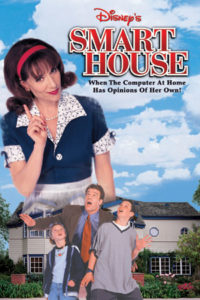 I’m a millennial, therefore when I hear the term “smart house,” my mind immediately goes to one of the best made-for-tv Disney movies of the 90’s aptly titled… SMART HOUSE! For those who have yet to see it, the premise is that a teenager wins a fully automated dream house in a competition, but after time the computer controlling the house begins to take over. Of course Smart House is pure fiction and in realty home automation is a bit more practical than the Smart House dream house. Home Automation is defined as the use of one or more computers to control basic household functions and features automatically and/or remotely.
I’m a millennial, therefore when I hear the term “smart house,” my mind immediately goes to one of the best made-for-tv Disney movies of the 90’s aptly titled… SMART HOUSE! For those who have yet to see it, the premise is that a teenager wins a fully automated dream house in a competition, but after time the computer controlling the house begins to take over. Of course Smart House is pure fiction and in realty home automation is a bit more practical than the Smart House dream house. Home Automation is defined as the use of one or more computers to control basic household functions and features automatically and/or remotely.
Typical home automation includes features such as centralized control of HVAC systems, lighting, appliances, air conditioning and locks on gates or doors. The purpose of home automation is to increase energy efficiency and comfort, and it also makes it easier to keep a home secure.
In recent years, home automation systems have increased in popularity due to becoming more affordable and having the ability to be controlled by computers or smartphone apps. Many recent systems combine electrical features in a home with one another… From the watering of plants to the more extravagant activation of domestic robots, home automation systems can include only a few simple tasks or a wide array of them. Remote access to the system when it is connected to the Internet allows homeowners the chance to control settings even when they are hundreds of miles away.
One major benefit of home automation is increased safety from possible break-ins. Turning the lights on and off randomly or turning the television on at different intervals gives the appearance of someone being home even if the occupants are on vacation in another country.
As people collect more controllable devices in their homes, connections between these devices and communication between them becomes more and more useful. Refrigerators or air conditioners can send alert messages when they need to be serviced, and an alarm system can call the police or a trusted contact if an intruder activates the system. Some people like home automation systems for the opportunity to change air conditioning or heating settings while they are away. This could be turning the heat or air down while they are on vacation, or some people may like to turn the heat down while they are gone but turn it back up before they leave work and head home. This means they can come home to a warm house instead of waiting to turn the heat up until they arrive home and subsequently waiting for the house to heat up while they are home. Home automation systems include sensors, controllers, actuators, buses and interfaces.
There a variety of ways that the presence of home automation can affect your home insurance premiums, often through various discounts or credits. Some forms of technology that may garner a discount from your insurance carrier include home security systems and high-tech water or gas-leak sensors. Active leak water sensors signal a leak and shut off the water source. Active systems may be installed on individual appliances or as a whole house solution. Gas detectors are most often passive. Sensors like these are particularly relevant to individuals who may have second homes or summer homes as they ensure system shut-offs in the event of a leak. To learn more about the benefits of these systems and how they could affect your home insurance, discuss your concerns with an agent.
